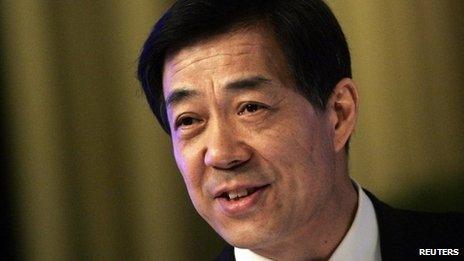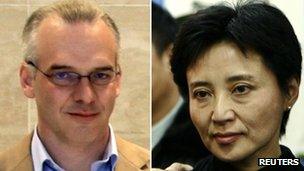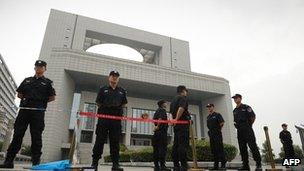Bo Xilai casts long shadow over Gu Kailai case
- Published

With Gu Kailai jailed, what happens to Bo Xilai?
The last chapter of a compelling murder mystery has just been written.
There is to be no executioner's bullet for the scheming murderess. It is quite a coup de theatre; the killer's life is saved because she had psychological problems and killed to protect her son.
So the case is closed, a terrible crime solved and a measure of justice given to both perpetrator and victim.
But on closer examination, this narrative seems all too neat and uncannily suited to one particular agenda.
And informed observers see the fingerprints of the Communist Party of China all over this outcome.
Towering figure
Of course, Gu Kailai may well be guilty of the crime. In fact, the allegation has a ring of plausibility to it partly because of how it came to light.
If Gu Kailai has been framed, then one has to wonder whether the Chinese authorities could have found easier ways to do it.
The case only came to light when a senior police chief fled to a US consulate alleging murder and a major political cover-up, a deeply messy and embarrassing incident for China.
But assuming she did it, there are still plenty of reasons to meddle in the conduct of the trial.
The biggest one, of course, is the towering figure of Gu Kailai's husband, Bo Xilai, who has cast a long political shadow over this case from the start.
It is impossible to overstate just how important a figure he was.
As party chief in the megacity of Chongqing, he was a member of the politburo, one of the 25 most senior party officials in China. And he was tipped for even higher things.
So the revelation that his wife killed her British business associate, Neil Heywood, by getting him drunk and stuffing his mouth with cyanide would have sent shock waves through the highest levels of the party leadership.

Chinese state media say Gu Kailai admitted killing Neil Heywood
At the very least, it would need careful handling.
But add to that the clear evidence of a major police cover up in Chongqing, a municipality in which Bo Xilai had direct control of the police, and it would quickly have begun to look like a major political scandal.
And finally, the suggestion that Neil Heywood may have fallen out over the assistance he gave the family in shifting large sums of money out of China raised the prospect of serious corruption.
If any of that came to light, it would risk tarnishing the reputation of the party itself - and in a year in which the Communist Party is about to undergo a delicate and carefully choreographed transition of power to a new generation of leaders.
'Status and influence'
China's courts, like everything in Chinese society, are expected to bend to the will of the party.
Mo Shaoping, the lawyer who represents jailed Nobel Peace Prize winner Liu Xiaobo, has spent his career negotiating the blurred boundary between politics and the law.
"China is not really a country ruled by law," he said. "It regards the cost of breaching its own laws as insignificant."

Foreign media have not been allowed to observe Gu Kailai's trial
"It is undeniable that under the current political situation here, Bo Xilai's status and influence are extra-judicial factors that will have unavoidable impacts on the case."
That is why many observers think the way the evidence has been presented and the conclusions reached are simply too convenient to be true.
Firstly, there is no mention of the possibility of financial corruption. Instead, Neil Heywood is said simply to have been in dispute with the family over a failed business deal.
And Gu Kailai is said to have killed him because she believed he was threatening her son.
Some newspaper articles have suggested that the defence-of-family line is designed to resonate with nationalist, anti-foreigner opinion in China.
In addition, it has given the judge an excuse to avoid sending Gu Kailai to the firing squad, thereby avoiding the risk that she would become a cause-celebre and the focus of even more international media attention.
"If Gu Kailai did poison Neil Heywood in order to protect her son, then according to Chinese law, the victim has faults too," Mo Shaoping explains. "The judge can use this to deliver a lower sentence."
And although four senior police officers have been put on trial for their part in the attempted cover-up, there has been absolutely no mention of what will happen to Bo Xilai.
"This is a criminal case, and society should see it as one," wrote the Communist Party tabloid, The Global Times, before the trial began.
Old scores
But some commentators have suggested that, despite the party's best efforts, the trial has done the opposite, exposing political divisions and tensions long kept below the surface.
Bo Xilai's success as politician was built partly on an appeal to old communist values, the public singing of "red songs," and a rejection of liberal economic reforms.
His family may be the author of its own downfall but it seems that old scores are now being settled.
The day before it was announced that Bo Xilai had been sacked from his position as party chief in Chongqing, Chinese Premier Wen Jiabao appeared to rebuke him in public.
He urged further political and economic reform and warned that without it, China could slip back into the dark days of the Cultural Revolution, an apparent reference to Bo Xilai's leftist revival movement in Chongqing.
Bo Xilai's father, Bo Yibo, was himself one of China's most senior politicians in the 1980s and was instrumental in the purging of Hu Yaobang, a liberal reformer and one of Wen Jiabao's mentors.
"In terms of politics and policy there is a huge gap between Wen Jiabao and Bo Xilai," Dr Ding Xueliang, professor of social sciences at the Hong Kong University of Science and Technology, said.
"It goes back to the 1980s, what may seem like ancient history to many people, but it is still fresh in the minds of China's modern leadership."
Unbreakable unity?
As Gu Kailai begins her prison sentence, China's leaders will hope that they have done all that they can to limit the damage.
They are helped in that regard by their monopoly on the control of information.
Outside the court in Hefei earlier this month, as the trial began, we found very few people who had even heard of Gu Kailai.
The case has been mentioned by the official state media, but some searches and postings on the internet about the case have been blocked.
Soon a new leadership will be in place and the man currently serving as vice-president, 59-year-old Xi Jinping, is widely expected to be anointed as the country's next leader.
But one extraordinary court case has at least hinted at the divisions and cracks that still lurk below the facade of singular, unbreakable, party unity.